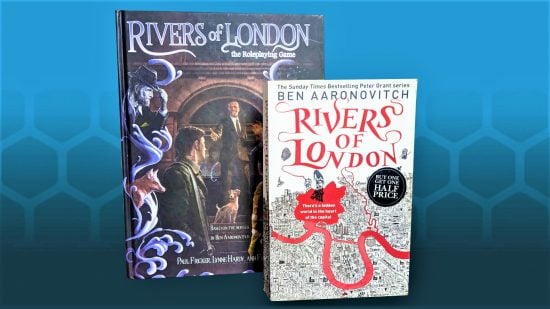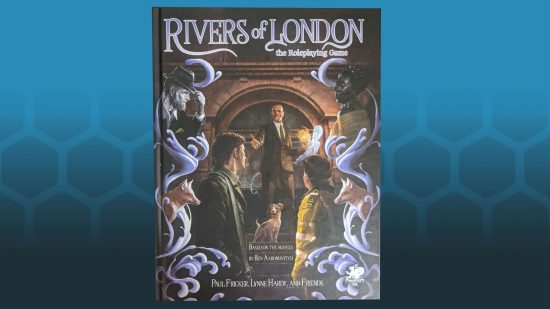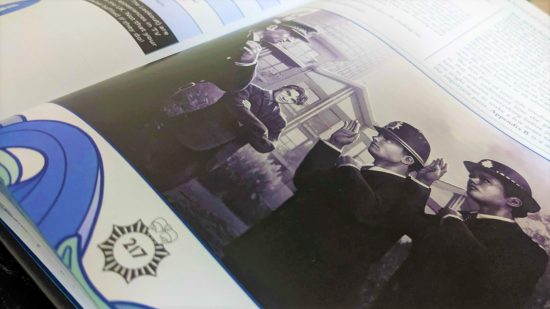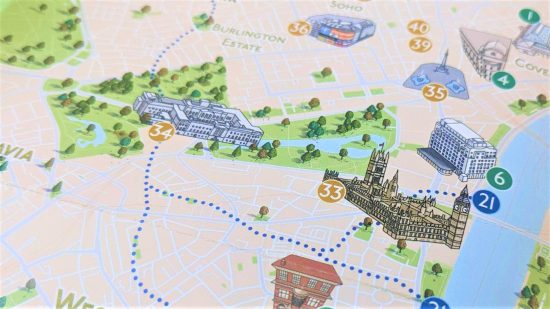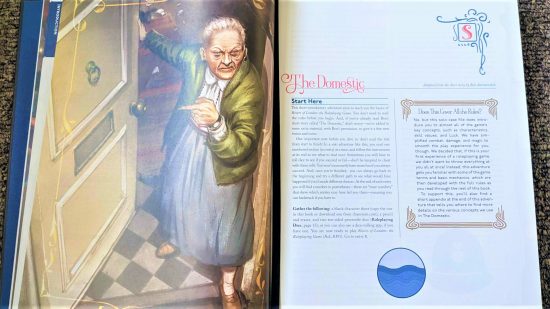Our Verdict
The Rivers of London RPG translates an exciting fantasy series into an engaging and beginner-friendly game. Its main folly is an overly-forgiving and at-times underwhelming RPG system that lowers the stakes of adventures - and may mean it struggles to shine next to other mystery RPGs.
Some authors look forward to the day their book is made into a movie, but not Ben Aaronovitch – he dreamt a crunchier dream, one where he’d have his own tabletop roleplaying game. That day finally arrives this April, as Chaosium releases Rivers of London: The Roleplaying Game.
The Rivers of London RPG takes Aaronovitch’s vision of a magical London police force, speaks a few magic forma over it, and transforms it into something new. The result? A highly approachable RPG with a unique and interesting setting. It’s light on rules and tone, guiding you through magical mysteries and moments of intrigue. There’s trouble in paradise, though, as the RPG system often feels too forgiving – and forgettable.
A little context for the review environment, before we begin. I’m a long-time player of Call of Cthulhu, and I’ve read many of Aaronovitch’s books. This meant, when Chaosium offered Wargamer a review copy, I was the prime suspect for the job. My thoughts are based on a complete readthrough, but not a playthrough – so bear this in mind before I blow this case wide open.
What is Rivers of London: The Roleplaying Game?
Rivers of London: The Roleplaying Game is a tabletop RPG adaptation of the Rivers of London book series by Ben Aaronovitch. Set in the UK capital, the books (and the RPG) follow a little-known British police department that can wield magic and investigate supernatural mysteries. The RPG uses the Basic Roleplaying system (also seen in Chaosium’s other products, Runequest and Call of Cthulhu) to recreate the mix of magic and criminal investigation seen in the books.
Everything you need to start playing Rivers of London is contained in a single book. It includes basic rules for character creation and play, advice for budding Game Masters, a starter adventure, and advanced rules in the back for anyone looking to modify their experience. There are also multiple chapters explaining lore and context – both for how a real London police force works and what went down in the Rivers of London books, in case you haven’t read them.
Who is Rivers of London: The Roleplaying Game for?
If you’re a fan of Aaronovitch’s books, you’ll be pleased to hear Chaosium does an excellent job recreating the feel of the series. It understands the themes at the heart of the stories and sets up a game where you can fight crime side-by-side with your favourite characters. The entire book is peppered with loving details and in-jokes for avid fans.
If you haven’t read the books, the first question you may be asking is ‘do I need to have read Rivers of London to play this?’. The honest answer is no – but there’s plenty more reading you’ll need to do to make up for it.
Fans of the novels can gloss over the lengthy explanations of how magic works in this version of Britain, the extended history and layout of your main HQ, and a who’s who of all the core characters from the series. It’s all essential stuff if you’re a newbie looking to recreate the original books, but it can feel like homework at times.
This is an RPG that’ll be best enjoyed by GMs that really love research. This shouldn’t be too surprising if you’re a fan of other Chaosium RPGs. Games like Call of Cthulhu and 7th Sea draw heavily on real history, and they encourage you to delight in every detail you can find to recreate a world gone by (even if there are significantly more pirates or eldritch monsters in your version). Rivers of London stays on-brand with this, encouraging you to delve deep into the workings of London as a setting.
Rivers of London works hard to onboard players who are new to the books, but it works even harder to appeal to roleplaying newbies. Its tone is clear and approachable, and the rules include an engaging tutorial where you learn to play through a quick solo adventure. The rules for GMs go above and beyond what you’d usually expect, advising you on everything from incorporating technology into your game to dealing with difficult players.
This approachability also means you can expect relative simplicity from your game. Crunchy combat is low on the list of priorities (though the optional rules can help bulk out your battle simulator). Death is also seen as a pretty unlikely outcome (Rivers of London points out it has no plans to be a ‘gritty’ detective game). While Rivers of London shares a system with Call of Cthulhu, it has none of its lethal bite.
Is Rivers of London: The Roleplaying Game good or bad?
While I applaud the approachability of Rivers of London, it’s also my biggest criticism. The system feels a little too forgiving. It answers the question “what if a bad roll gets in the way of the plot?” by making it nigh-impossible to fail. You’re only likely to miss a clue on a critical failure; if you do miss it, there should be at least three more chances to find it elsewhere; if that doesn’t work, a high roll means your character suddenly remembers some key information; and if that doesn’t work, there’s a god-like NPC in the reserves to tell you where to go next.
Combat also feels like it’s bubblewrapped; Rivers of London advises the reader that NPCs should almost never be trying to kill a player. It makes sense that, in a game about solving mysteries, you should be trying to steer players to a satisfying, mystery-solved experience. But the system is so overly forgiving, it diminishes its own stakes.
Other mystery-focused systems often account for failure by expanding gameplay around the mystery. Behind-the-scenes of an investigation in Vaesen, there are rising stakes that mean players will encounter something exciting, even if they fail. Call of Cthulhu combines unknowable horrors with sleuthing so it still feels exciting (and makes sense) if players don’t wrap their heads around a clue in time. Rivers of London doesn’t seem to account for a world where the cops don’t catch their culprit.
There are a lot of details in the rulebook to love. The luck system works well and can help you expand your skills during play, and the additional rules provide a nice balance of strategy and storytelling. Lethality aside, the combat system feels well-oiled and highly interactive (even if the way you roll damage seems a little overcomplicated). I also appreciated that Rivers of London took time to address the very real criticisms of the British police, which a fun mystery romp could otherwise have glossed over.
Rivers of London is a thoughtful adaptation of the unique world Aaronovitch created in his book series. It’s a fascinating setting for players to explore, and the system is approachable and well-designed enough to facilitate fun. However, it wouldn’t be my first recommendation unless you’re invested in seeing that specific world come to life. In a crowded lineup of mystery RPGs, Rivers of London’s system isn’t quite strong enough to stand out.
